On-Site and Off-Site Clinical Services
The Center for Communication Sciences & Disorders provides comprehensive diagnostic and therapy services for a wide range of communication disorders across all age groups. Services are provided to all individuals on an equal basis. No person will be denied participation in, or benefits from, our programs and services on the basis of age, race, color, sex, national origin, religion, disability, or status as a veteran. We are committed to ensuring nondiscrimination and equal access for every individual, and we strive to create an environment where all people are treated with dignity and respect. We offer services both on and off-campus. Areas evaluated and treated include:
On Campus Services
- Adult Speech Disorders
- Adult Language or Cognitive Impairments
- Assessment Clinic
- Audiology/Hearing Services
- Augmentative and Alternative Communication
- Child Speech Disorders
- Child Language Disorders
- Child Feeding/Swallowing Disorders (Dysphagia)
- Voice and Resonance
On Campus Groups
- Camp Maverick & Rec N' Read
- Care Partner Support Group
- Early Childhood Play Group
- Mankato Chapter of the Stuttering Association
- MSU Aphasia Group
- SPEAK OUT!® Therapy Program
Off Campus Services
- Dementia Friendly Meaningful Engagement
- Madelia Public Schools
- Mankato Youth Place (MYPlace)
- Minnesota Connect Aphasia Now (MnCAN) Aphasia Group
- SPEAK OUT® Therapy Program at Vine Faith in Action
- Speech N' Scenery
- Speech/Language Screens
On Campus Services
Adult Speech Disorders
Acquired Apraxia of Speech (stroke/traumatic brain injury), Dysarthria (Parkinsons Disease/stroke/traumatic brain injury); Voice Disorders (Spasmodic Dysphonia, Vocal polyps/nodules, Exercise Induced Laryngeal Dysfunction, Parkinson's Disease); Fluency Disorder/stuttering.
Adult Feeding/Swallowing Disorders (Dysphagia)
Conditions causing swallowing problems can make it difficult for individuals to chew and swallow their food. Conditions that are common with difficulty swallowing include: stroke, brain injury, spinal cord injury, Parkinson's disease, Multiple Sclerosis, ALS (amyotrophic lateral sclerosis), muscular dystrophy, cerebral palsy, Alzheimer's disease, and head and neck cancer.
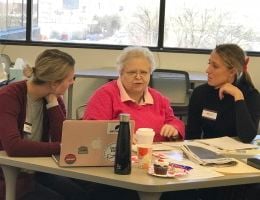
Adult Language or Cognitive Impairments
Acquired Aphasia/language impairments (stroke/traumatic brain injury/concussions); Cognitive impairments resulting from injury/disease (traumatic brain injury/concussion, Alzheimer's/Dementia, right hemisphere brain injury, Parkinson's).
Assessment Clinic
Provides comprehensive assessment and intervention services for children and adults across the full scope of speech-language pathology, including speech sound production, voice, fluency, swallowing, cognitive-communication, and language. Services also support individuals with reading, writing, and other academic difficulties, such as dyslexia, executive functioning disorders, and language-based learning challenges.
Literacy and Learning Diagnostic Clinic
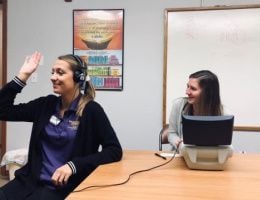
Audiology/Hearing Services
Comprehensive hearing assessments and screenings as well as testing for central auditory processing disorders for all age groups.
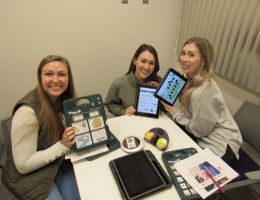
Augmentative and Alternative Communication
Offers services to children and adults with severe speech/language problems that may need an alternative means of communication such as a low or high-tech (speech generating) communication device.
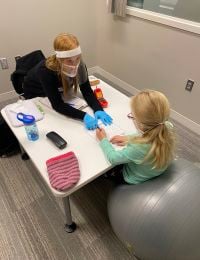
Child Speech Disorders
Childhood apraxia of speech, dysarthria (cerebral palsy/brain injury), phonological impairment, speech sound disorders/articulation, orofacial myofunctional disorders, fluency disorder/stuttering, and voice.
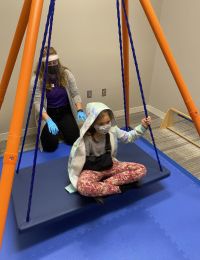
Child Language Disorders
Development delays or disorders resulting from various learning disabilities (dyslexia, dysgraphia, ADHD, executive functioning, auditory processing disorder, language processing disorder, nonverbal learning disabilities); social language impairments resulting from Autism Spectrum Disorders; acquired brain injuries or concussions resulting in language and/or cognitive impairments.
Child Feeding/Swallowing Disorders (Dysphagia)
Infants and children with difficulty eating due to structural or functional problems in the mouth, throat, or esophagus resulting in weak or damaged muscles used for feeding and swallowing. Some disorders related to these difficulties include: brain injury, birth defects, cleft palate, cerebral palsy, reflux, neuromuscular disease, prematurity, sensory problems/sensitivity to textures, stroke, or structural problems such as tongue/lip tie.
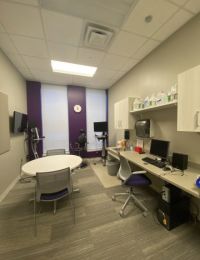
Voice and Resonance
Our clinic provides evaluation and treatment of voice disorders in the Voice Analysis Lab. Voice disorders encompass a broad range of conditions that affect vocal quality, from long-term hoarseness to vocal fold paralysis. Depending on the cause, vocal changes may be temporary or permanent. Therapy focuses on improving overall voice quality and establishing healthy vocal habits.
Contact Information
Email: centercsd@mnsu.edu
Phone: 507-389-6298
Fax: 507-389-1414
Office: Clinical Sciences Building 115
On Campus Groups
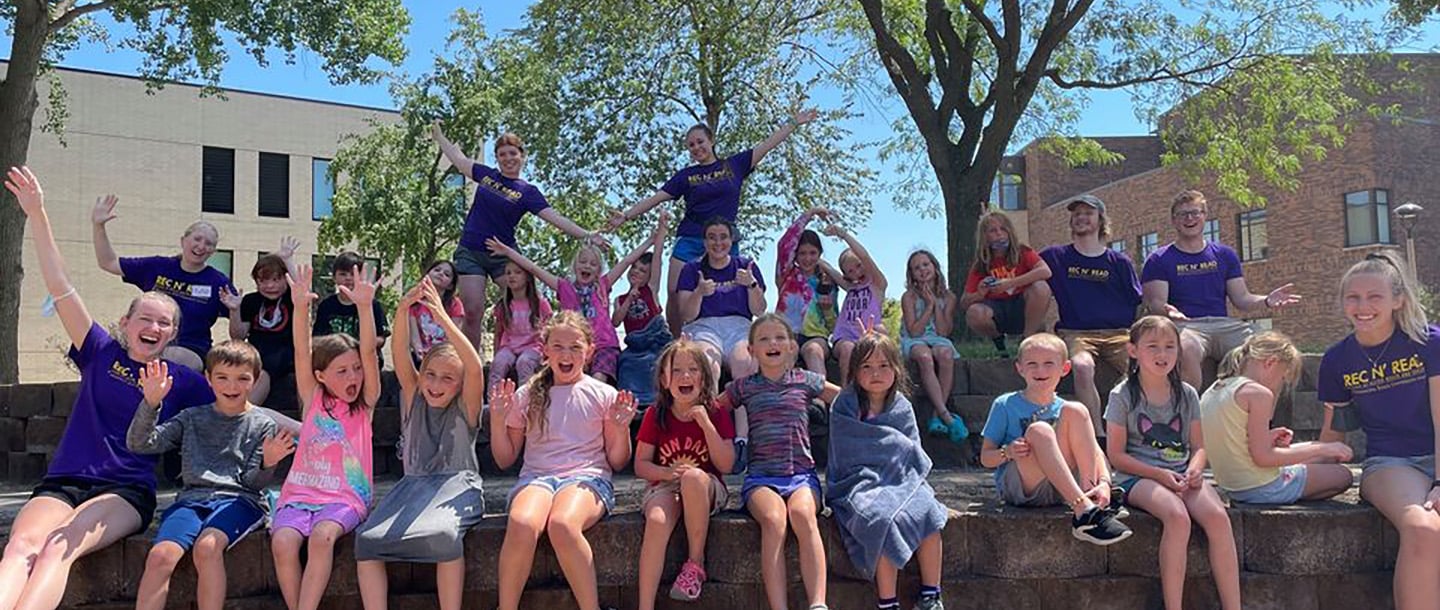 Camp Maverick & Rec N' Read
Camp Maverick & Rec N' Read
Summer recreation and literacy intervention camp designed to help struggling readers improve reading and writing skills while having fun and playing games.
Mankato Chapter of the Stuttering Association
The Mankato Chapter of the National Stuttering Association (NSA) supports adults who stutter.
Mankato Chapter of the Stuttering Association
SPEAK OUT!® Therapy Program
The SPEAK OUT!® Parkinson’s program is a two-part therapy approach that strengthens the muscles used for speaking and swallowing by combining individual speech therapy (SPEAK OUT!®) with ongoing group therapy (LOUD Crowd®)
Off Campus Services
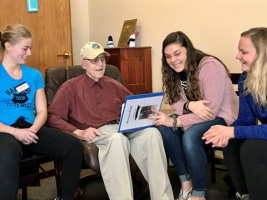
Dementia Friendly Meaningful Engagement
Dementia-Friendly Meaningful EngAGEment provides patient-centered services for individuals with dementia and real-world learning experiences for our students to work with individuals with dementia. This program includes both our Memory Book program and our Garden EngAGEment programs.
Dementia Friendly Meaningful Engagement
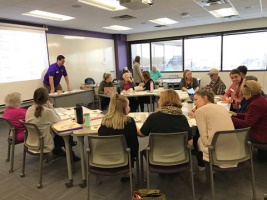
Minnesota Connect Aphasia Now (MnCAN) Aphasia Group
Group for adults ages 18+ with aphasia is designed to create natural conversation and interaction experiences with support from trained graduate students and a Certified Speech-Language Pathologist.
Minnesota Connect Aphasia Now (MnCAN) Aphasia Group

